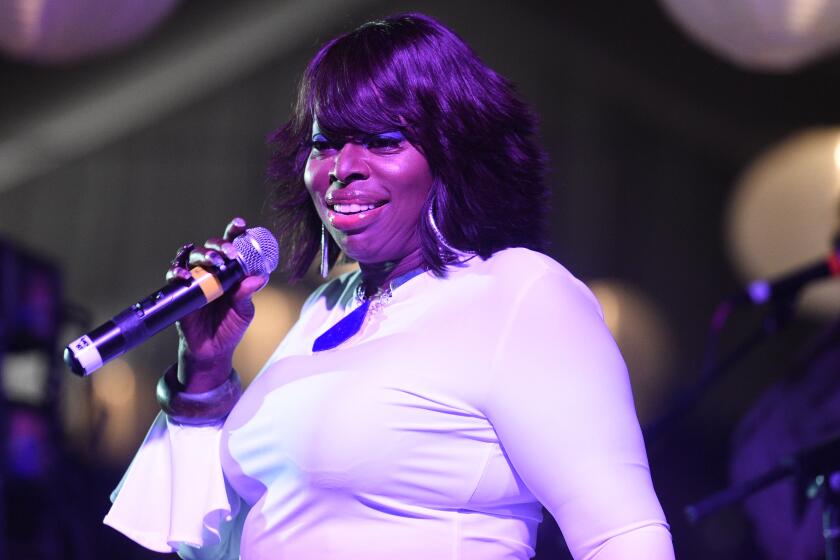In tense times, Brown stays cool
- Share via
On April 5, 1968, James Brown stood as a voice of reason and restraint in a city on the edge of rampage. The Rev. Martin Luther King Jr. had been assassinated the day before in Memphis, Tenn., and the sense of outrage and hurt in African American communities led to rioting in more than 100 U.S. cities. Boston might have joined that list except for the heroics of Brown.
The R&B; superstar was scheduled to perform at the Boston Garden arena, though civic officials were considering canceling the concert, fearful that it would turn into a disturbance. But a black city councilman convinced Boston’s white mayor, Kevin White, that the concert would have a positive effect, and White and others persuaded a local television station to broadcast the concert live.
One of the three discs in the new DVD set, “I Got the Feelin’: James Brown in the ‘60s,” focuses on the events of that day, including highlights from the show and interviews with several of the city officials involved. One of the other discs presents the full Boston concert, while the third disc is built around a Brown concert earlier that year at Harlem’s historic Apollo Theater.
Because of personal and legal problems in Brown’s later years, the singer’s reputation was tarnished at the time of his death at age 73 in December 2006. This package, out today, not only reminds us of Brown’s greatness as a musical figure but also celebrates one glittering display of his humanity.
Also available today is a four-disc CD set from Sony BMG that marks another landmark pop moment from 1968, this one involving Elvis Presley.
James Brown
“I Got the Feelin’: James Brown in the ‘60s”
Shout! Factory
The back story: Brown, who was born in a one-room shack in South Carolina and spent time in a youth prison, had every right to be resentful of American society. But he turned his life around, and during several of his most vital years as a musician, he tried to inspire others to achieve. In the process, he became a more powerful symbol of black culture and aspiration than any other singer, thanks to such hits as “Say It Loud -- I’m Black and I’m Proud” and “I Got You (I Feel Good).”
In the set’s documentary, directed by David Leaf and titled “The Night James Brown Saved Boston,” you can feel the tension through the evening, especially during a six-minute segment near the end of the concert when a couple of black fans jump on stage, only to be pushed away by a white policeman. Seeing this, Brown encourages the policemen to go to the side of that stage, assuring them that everything will be OK.
Soon, he’s surrounded by young fans, but he keeps talking to them, eventually getting them to go back to their seats so that the show can continue. In a call for unity, he tells the crowd, “We’re black, we’re black.”
Watching Brown’s spectacular dance steps in connection with the sensual funk beat on the concert discs, you see how he served as a model for such other classic performers as Michael Jackson, Prince and Mick Jagger. But even watching those moves with the sound turned down, you can feel the spirit and self-affirmation that he celebrated in every spin. An essential pop document.
--
Elvis Presley
“Elvis -- The Complete ’68 Comeback Special”
Sony BMG
The back story: After all those years of humdrum movies, Elvis Presley was in danger of being discarded as a pop relic when NBC-TV signed him to headline a concert special for December 1968. Presley shook off the cobwebs in the show, especially in an informal “sit-down” segment in which he donned a black leather outfit and delivered passionate renditions of some of his prized early material, including “One Night” and “Love Me.”
In the four-disc set, which covers the music from rehearsals as well as two run-throughs of the production, we literally hear Presley resurrecting his career. In a 32-page booklet included in the set, Harvey Kubernik tells the fascinating story behind the TV special, including key decisions that changed the nature of the show. To see the special, try “Elvis: ’68 Comeback,” which has long been available on DVD.
--
Backtracking is a biweekly feature devoted to CD reissues and other historical pop items.
More to Read
The biggest entertainment stories
Get our big stories about Hollywood, film, television, music, arts, culture and more right in your inbox as soon as they publish.
You may occasionally receive promotional content from the Los Angeles Times.










